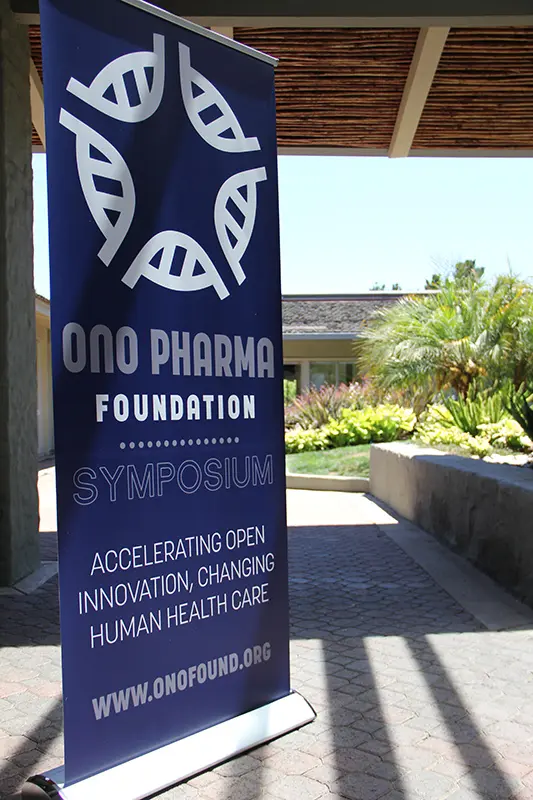The Ono Initiative
Annually, the Ono Pharma Foundation considers proposals from PIs for research that could ultimately transform human health. Although additional areas of research may be added in future years, in 2023-2024 the Ono Pharma Foundation will only consider proposals for scientific research addressing Chemical Biology research
Chemical Biology is defined as research that deals with the interface between chemistry and biology. The criteria for this field are deliberately broad so as not to disqualify potentially innovative and groundbreaking projects.

Evaluation Criteria
Applications will be assessed and awards will be made based upon the following criteria:
SCIENTIFIC
MERIT
Applications will be evaluated based on the scientific merit of the research proposal.
RELEVANT TO OUR MISSION
Applications will be evaluated based on their relevance to Ono Pharma Foundation’s mission: significance, innovation and approach.
TECHNICAL CONSIDERATIONS
Applications will be judged on their consideration and understanding of the technology required for completion.
QUALIFICATIONS
Principle Investigators will need to prove their relevant experience and qualifications.
RESEARCH ENVIRONMENT
Evidence will need to be provided of a suitable environment to conduct study.
Eligibility
Applicants must meet the following requirements. LOIs and final Proposals from applicants not meeting the requirements listed below will not be considered.
- PIs applying must be working at one of the nominating institutions. Nominating institutions might be replaced or added to in subsequent years.
- The PI must have an MD and/or a PhD degree.
- The PI must be a new applicant to the Ono Initiative, or, if they are a returning applicant, must be applying for a project different from the one they previously proposed.
- The PI must be a young and/or mid-career scientist (15 years or below of experience from starting independent academic position).
- The PI may not already be engaged in other sponsored research with Ono Pharmaceutical Co., Ltd. and/or grant program with Ono Pharma Foundation.
- The PI may not apply for funding to amplify current work. However, PIs may research a new idea based on a prior finding of the PI.
- The PI must not be a healthcare professional (defined as individuals currently holding an active state license for which they are (a) qualified to prescribe, administer, use or supply any medicinal or medical products or (b) perform any professional clinical services). A PI with an MD but without an active state medical license is still eligible.
- PIs serving on a healthcare formulary or similar committee are not eligible.
- As a US private foundation, Ono Pharma Foundation grants to Canadian institutions are conditioned on an equivalency determination by the Foundation. This may require additional documentation and information from the institution outside of the application process.

Timeline
The timetable for both steps of the Application Process is outlined below in detail.
-
November 27, 2023
Funding Opportunity Program Announcement for 2023 Awards
Funding Opportunity Program Announcement for 2023 Awards
-
November 27, 2023
LOI submission open
Responsible Party: Ono Pharma Foundation
-
February 15, 2024
LOI submission due date
Responsible Party: PI/Instituion
-
April 17, 2024
Request for Proposal (“RFP”) sent out
Responsible Party: Ono Pharma Foundation
-
May 09, 2024
Proposal due date
Responsible Party: PI
-
July 01, 2024
Announcement of the Awards
Responsible Party: Ono Pharma Foundation
-
August 01, 2024
Project Start
Responsible Party: PI
How to apply
Letter of Interest
LOI: PIs should first contact the administration office of their Institution. Institutions will be asked to nominate PIs, but only the PI may submit LOIs and Proposals. An LOI should be submitted through the Ono Pharma Foundation online portal.
An LOI submission must include the following information:
- Contact Information
- Abstract – no more than 150 words. The abstract should provide a brief description of the PI’s project’s goal(s).
- Vision of the Proposed Research – one page single-spaced 12pt font. CV and reference list do not contribute to word/page limit. Figures may be included but should not exceed an additional two pages. If there is a figure that best explains your project, please indicate which one. This will help our Scientific Advisory Board as they review.
- Curriculum vitae (“CV”)
- The CV may not exceed five pages
- NIH Biosketch format is preferred. The new format extends the page limit for the biosketch from four to five pages, and allows researchers to describe up to five of their most significant contributions to science, along with the historical background that framed their research. Investigators can outline the central findings of prior work and the influence of those findings on the investigator’s field.
- The CV must disclose all grants or awards currently received or pending which would be relevant to the Proposed Research.
Proposal
PIs invited to submit a full Proposal will receive instructions via email and in the Ono Pharma Foundation portal.
The Proposal – in response to the RFP – must include the following information:
- A detailed Research Plan (no more than seven pages), including:
- Background on the area(s) of research and key gaps in our understanding of the field or important challenges to be addressed.
- Recent progress by the PI, focusing on the past five years. Do not repeat material adequately covered in the prior CV or Biosketch. Do not include a Publication List.
- Overview of the Research Proposal. This should be a description of the key questions or challenges the PI plans to address and the general strategies. A detailed experimental plan is not expected. The proposed direction of the PI’s scientific project will be considered in the review process. If new opportunities or directions arise during the course of the research, the PI will have the flexibility to change course and pursue them. If such a development should occur, the PI should be in touch promptly with the Ono Pharma Foundation.
- Itemized PI budget for the Proposal – not part of the Proposal page/word limit
- If needed, the prior CV can be updated
- Other research, describing overlap with Ono Initiative
Ready to Submit?
Frequently Asked Questions
The Ono Initiative supports creative research conducted by emerging Chemical Biologists in search of new discoveries, solutions, and the development of high-impact science.
The goals of the Ono Initiative are to:
- Identify and develop innovative research proposals and results that could lead to the development of breakthrough treatment solutions for patients.
- Support academic research and the career development of promising young and established scientists.
- Build strong relationships within the community in order to lead to transformative research aligned with Ono Initiative's interest.
All grants awarded by Ono Pharma Foundation have a three year term.
Awards will consist of annual funding of $300,000/year, totaling a maximum of $900,000 for the normal term of a research project. The Ono Pharma Foundation will provide up to an additional 15% ($45,000) per year to be used for indirect costs of the PI’s institution. In total, Ono Pharma Foundation’s three-year research awards provide up to $1,035,000 to researchers and their institutions.
Three Awards are planned for 2024, contingent upon Ono Pharma Foundation appropriations and the submission of sufficient meritorious applications.
The Ono Pharma Foundation selects all Awardees based upon recommendations of its Scientific Advisory Board (“SAB”), which is comprised of outside experts from the fields of Chemical Biology.
2024 Applicant Nominating Institutions in Chemical Biology Research *
- Albert Einstein College of Medicine
- Baylor College of Medicine
- Boston College
- California Institute of Technology
- Carnegie Mellon University
- Columbia University
- Cornell University
- Duke University
- Emory University
- Fred Hutchinson Cancer Research Institute
- Georgia Institute of Technology
- Harvard University
- Huntington Medical Research Institutes
- Johns Hopkins University
- Kennesaw State University
- Louisiana State University
- Loyola University Chicago
- Massachusetts Institute of Technology
- McGill University
- Memorial Sloan Kettering Cancer Center
- Michigan State University
- Northeastern University
- Northwestern University
- Ontario Tech University
- Oregon Health and Science University
- Princeton University
- Rice University
- Salk Institute for Biological Studies
- Stanford University
- The Broad Institute of Harvard and MIT
- The Rockefeller University
- The Scripps Research Institute
- The University of Chicago
- The University of Texas – Austin
- The University of Texas – Southwestern Medical Center
- The University of Texas MD Anderson Cancer Center
- The University of Utah
- University of Alberta
- University of British Columbia
- University of California – Berkeley
- University of California – Davis
- University of California – Irvine
- University of California – Los Angeles
- University of California – San Diego
- University of California – San Francisco
- University of California – Santa Barbara
- University of Colorado – Boulder
- University of Florida
- University of Illinois at Urbana – Champaign
- University of Massachusetts – Amherst
- University of Massachusetts – Medical School
- University of Michigan
- University of Minnesota
- University of North Carolina at Chapel Hill
- University of Notre Dame
- University of Pittsburgh
- University of Toronto
- University of Virginia
- University of Washington
- University of Wisconsin – Madison
- Wayne State University
- Vanderbilt University
- Virginia Commonwealth University
- Weill Cornell Medicine
- Whitehead Institute
- Yale University
*Each Nominating Institution may nominate up to two (2) applicants in Chemical Biology Research.